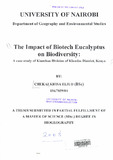| dc.description.abstract | This study examined the effects of biotech eucalyptus on biodiversity. In this study
biodiversity was taken to mean all the life forms including human beings. Biotech
eucalyptus (genetically superior eucalyptus tree seedlings and clones) were introduced
in Kenya in 1997 through the Tree Biotechnology Project (TBP). Although
biotechnology trees are now popular in Kenya, no information exists on the likely
environmental risks. This study is therefore an attempt to assess the likely impact on
biodiversity. The objectives of the study were to determine whether the coverage and
the pattern of planting biotech eucalyptus has any significant influence on
biodiversity, the impacts of the biotech eucalyptus on biodiversity and the socioeconomic
aspects and identify ways of preventing or mitigating the negative
consequences of biotech eucalyptus on biodiversity and environment. Kiambu District
where the study was conducted represent high potential areas, where impact on other
biodiversity is likely to be felt fast. The local name for eucalyptus is "munywamae"
meaning, "it draws a lot of water." Data collection strategies involved perusal of
existing literature and project records as wen as field data collection using purposive
sampling in the selection of farmers. Biodiversity was assessed using belt transects in
plots measuring 32 x 22 metres. Various methods of data analysis and presentation
were used to facilitate interpretation of data collected. These included both qualitative
and quantitative analysis such as Shannon- Wiener index (H) and Chi-Square. Results
indicated that biotech eucalyptus has positive aspects on biodiversity such as fast
growth, thus increasing vegetation cover, providing habitat to unique animals, shade
and windbreak. Socio-economic benefits include provision of fuelwood, building
materials and a quick source of income in a relatively short time. Negative impacts
include low flora diversity as a result of allelopathy leading to lack of food for
animals. It is also prone to fires, drying up water resources and reduction of soil
fertility and moisture. The study recommends enactment and enforcement of a policy
requiring Environmental Impact Assessment to be carried out before any large scale
planting of biotech eucalyptus. Other recommendations include banning of planting of
these trees in sensitive ecosystems such as conservation areas and watercatchrnents.
Awareness campaigns to sensitize and educate farmers on possible impacts and
mitigation measures should be mounted. Further research is also necessary to assess
the economic benefits from the biotech eucalyptus in comparison with other crops and
to determine its impact on the water balance of an area. In conclusion, it is hoped that
data and information generated by this study' would be useful in planning,
implementation and management of future projects involving land use in regard to
planting of biotech eucalyptus. The target audience will be the Tree Biotechnology
Project, Non-Governmental and Governmental organizations that participated in the
research. A copy of the report will be sent to them. Other target audience will be the
farmers who will get the information through the Governmental and Non-
Governmental organizations. | en |

